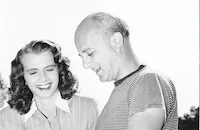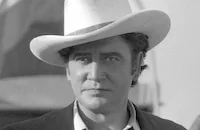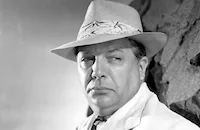The Power of the Whistler

Brief Synopsis
Cast & Crew
Lew Landers
Richard Dix
Janis Carter
Jeff Donnell
Loren Tindall
Tala Birell
Film Details
Technical Specs

Synopsis
After he is struck by a car while crossing a street, William Everest stumbles into a café, dazed. Jean Lang, her sister Francie, and Francie's fiancé, Charlie Kent, are playing cards at the café, and when Jean decides to use the deck to tell the newcomer's fortune, she turns over the death card. Feeling obligated to warn the man of his great danger, Jean approaches him and discovers that he is suffering from amnesia. Hoping for a clue to his identity, Jean examines the contents of his pockets and finds an order for a birthday cake, a Canadian dollar with a license plate number penciled on it, a railroad schedule to Woodville, a doctor's prescription, a skeleton key, a cigarette lighter inscribed "EC to JC" and a receipt for two dozen roses to be sent to Constantina Ivanska, a dancer performing at the Civic Theater. Jean suggests visiting Constantina at the theater to see if she recognizes Everest, but the dancer is unable to identify him. Next, Jean and Everest go to the doctor's address printed on the prescription form, but instead of a doctor's office, they find a bookstore. While Jean enters the shop, Everest waits outside and offers to watch a little girl's kitten while she goes to buy an ice cream cone. The proprietor of the store recognizes Everest and remembers that he was looking at a book about poison. Puzzled by the information, Jean leaves the store to rejoin Everest, and when the little girl returns, she discovers that her kitten is dead. Feeling responsible for Everest, whom she decides to call George, Jean takes him home to spend the night at the apartment she shares with Francie. The next morning, Francie awakens to find her pet bird dead. When Jean suggests dividing up the contents of Everest's pocket in hopes of uncovering his identity, Everest takes the Canadian dollar while Francie accepts the bakery order, cigarette lighter and prescription and Jean pockets the skeleton key and train schedule. Through the department of motor vehicles, Everest learns that the license plate is registered to Judge Edward Nesbitt, who now resides in Woodville. The judge's name jars Everest's memory, and he recalls his identity and his mission. Meanwhile, Francie shows the prescription to a printer, who remembers making the forms for the pharmacy across the street. Proceeding to the pharmacy, Francie shows the prescription to the druggist, who he tells her that it was for poison. Upon leaving the drugstore, Francie sees the bakery truck, and when she shows the driver the order for the cake, he remembers that a man picked up the cake and then returned it, requesting that it be shipped to a man named Dr. John Crawford at the Hudson Mental Institution. When Jean returns from the key shop to meet Everest, he tells her that he has remembered a man named Edward Nesbitt who lives in Woodville. Claiming that he is certain that Nesbitt is the key to regaining his memory, Everest tells Jean that he is in love with her and asks her to accompany him to Woodville. When Jean fails to return home, Francie, worried, confides her suspicions about Everest to Charlie, who sends her to the police while he rounds up Constantina, the druggist and the bakery delivery boy. The police are skeptical of Francie's story until Charlie arrives at police headquarters, and Constantina finally admits that Everest is a homicidal maniac who was committed to the Hudson Mental Hospital by Judge Nesbitt. When Francie informs them that Everest sent a poisoned birthday cake to Crawford, the police attempt to phone the Crawford residence to warn him, but a storm disrupts the call. The police then notify the Woodville police to be on the lookout for Everest. At the Woodville train station, Everest borrows the station master's car to drive to Nesbitt's house, and when he switches on the radio, he hears a broadcast about a police dragnet looking for him. Meanwhile, at the Crawford house, John and his son are about to devour the birthday cake when the police arrive and notify them that it is poisoned. Soon after, the police stop Everest's car in Woodville, and he claims to be John and introduces Jean as his nurse. Satisfied, the police leave and Jean begins to question Everest about John. Jean's questions agitate Everest, who pulls a knife from his pocket and calmly announces that he plans to slit Jean's throat. Jean then runs from the car into the woods, with Everest in pursuit. The police, meanwhile, alerted about Everest's arrival by the station master, drive toward the Nesbitt house, and when they see Everest's car stopped along the road, they begin to search the woods. Seeking refuge, Jean runs into a barn, and when Everest follows, she stabs him to death with a pitchfork, thus fulfilling her prophesy of his death.

Director

Lew Landers
Cast

Richard Dix

Janis Carter

Jeff Donnell
Loren Tindall
Tala Birell

John Abbott
Murray Alper

Cy Kendall
Crew
Irvin Berwick
Reg Browne
Sidney Clifford
John Datu
Wilbur Hatch
Hugh Mcdowell
L. W. O'connell
Leonard S. Picker
Victor Scheurich
Leonard J. Shapiro
Aubrey Wisberg

Film Details
Technical Specs

Articles
The Power of the Whistler (1945) -
Dix, whose birth name was Ernest Carlton Brimmer, starred in the first seven Whistler movies before he suffered a heart attack and retired from the screen. (He died soon after, in 1949.) His career, however, stretched back to 1917 and he had already appeared in nearly 100 titles. He was best known for westerns, and was nominated for an Academy Award for his performance in Cimarron (1931). But this final period of his career, making B pictures like the Whistlers and the superb Val Lewton production The Ghost Ship (1943), was a fine stretch that used his startling, somewhat hulking presence very effectively.
The Whistler films all had unrelated, stand-alone stories, and Dix played a new character in each. The series was based on a famous radio show that ran from 1942-52, and while the films are of varying quality, in general they are well-made, offbeat, suspenseful programmers, arguably part of the film noir style then at its peak. Of the eight films, Mysterious Intruder (1946) is widely considered the best, but The Power of the Whistler is one of the better ones, and Dix's perfectly creepy performance, in which he is called on to portray several personalities, is possibly his best of the series. His character is so disquieting that small animals tend to show up dead around him. In real life, Dix was beloved by his colleagues, and during production the cast and crew threw him a party to celebrate the anniversary of the start of his Hollywood career.
The Power of the Whistler was well-reviewed, with critics praising the film for its better-than-average suspense and melodrama.
By Jeremy Arnold
SOURCES:
Dan Van Neste, The Whistler: Stepping Into the Shadows
Michael R. Pitts, Famous Movie Detectives II
Ron Backer, Mystery Movie Series of 1940s Hollywood

The Power of the Whistler (1945) -
Quotes
Trivia
Notes
As in all the other films in "The Whistler" series, this picture is introduced by the shadowy figure of "The Whistler" who whistles a haunting tune and then declares, "I am The Whistler, I know many strange tales..." The Whistler also closes the story, revealing the fate of the protagonist. For additional information on the series, please consult the Series Index and see the entry below for The Whistler.














